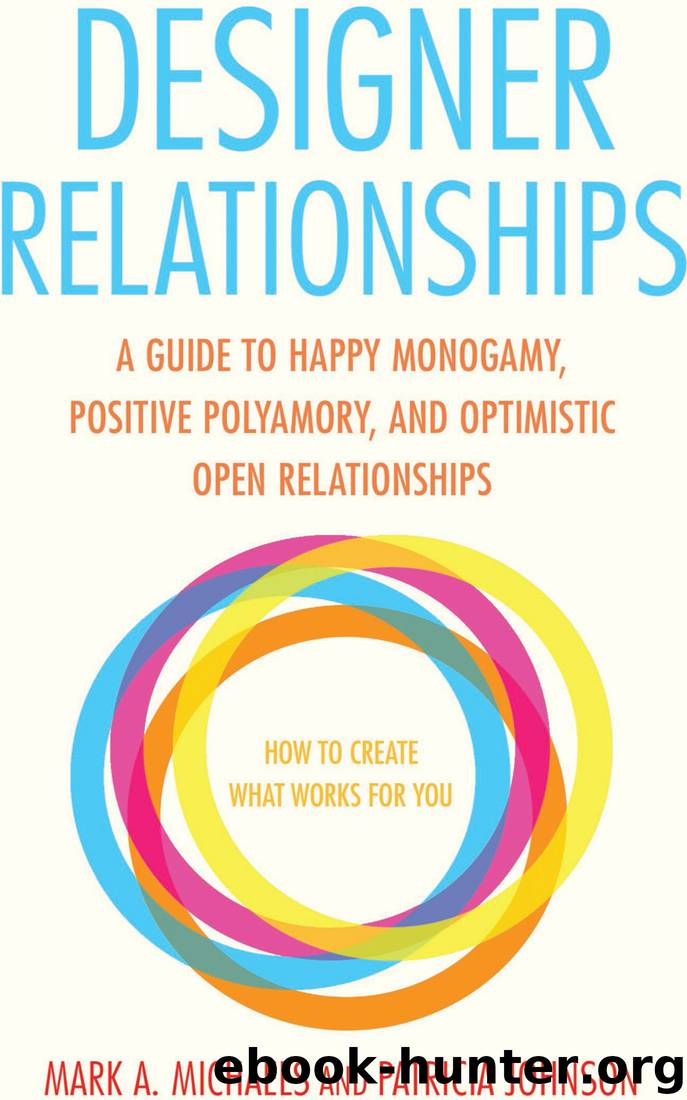Designer Relationships by Mark Michaels

Author:Mark Michaels [Michaels, Mark]
Language: eng
Format: epub
ISBN: 9781627781473
Publisher: Cleis Press
Published: 2015-08-27T04:00:00+00:00
Misconception #7: People in Nonmonogamous Relationships Have a Higher Rate of Separation and Divorce
Because mononormative beliefs have such a strong hold on the popular imagination, it’s almost universally assumed that nonmonogamous relationships are inherently troubled, that the decision to be open is itself an indicator of a serious problem. There’s no solid evidence to support this claim. In fact, the available evidence, both anecdotal and statistical, suggests otherwise: we’ve encountered several swinging couples who credit the decision to open up—sometimes made after many years of marriage—with saving or revitalizing their relationships.
Moreover, as we’ve already observed, there’s considerable evidence that people in nonmonogamous designer relationships have a higher level of relationship satisfaction than the general public. In a study of swingers conducted in 2000, 78.5 percent described themselves as being “very happy” in their marriages, as opposed to sixty-four percent in the general population. In addition:
62.6 percent of swingers found that swinging improved their marriages/relationships, 35.6 percent said their relationships stayed about the same, and only 1.7 percent said they became less happy. Even among those who said their marriages were “very happy” prior to swinging, nearly half (49.7 percent) said they became happier. Among those with the most unhappy marriages 90.4 percent said their relationship became happier after swinging. It appears that, at least among the sample of swingers used in this research, swinging tends to improve the perceived quality of the couples’ marriages regardless of how satisfying it was before swinging.
These results were consistent across genders.65
In a more recent study, nearly 49.6 percent of men and 53.7 percent of women said it was “true” or “mostly true” that “swinging strengthened my marriage.” An additional 22.3 percent of men and 22.4 percent of women said the statement was “somewhat true.”66 With regard to swinging, at least, it’s overwhelmingly clear that most people who participate feel that nonmonogamy enhances their relationship, at least to some degree, and that they may be substantially more happily married than the general public.
Although there are numerous unsubstantiated claims on the Internet that divorce rates among swingers are lower than for the general public, there does not appear to be any reliable recent research on divorce rates and nonmonogamous relationships. There are abundant anecdotes on both sides, but the argument that consensually nonmonogamous marriages are somewhat less likely to end in divorce makes intuitive sense, given the significantly higher levels of relationship satisfaction reported in multiple studies. And as we’ll suggest in discussing the next misconception, focusing on divorce or breakup as a sign of relationship “failure” is a mistake. Satisfaction or happiness within a relationship strikes us as being a more valid measure of success.
Download
This site does not store any files on its server. We only index and link to content provided by other sites. Please contact the content providers to delete copyright contents if any and email us, we'll remove relevant links or contents immediately.
| African-American Studies | Asian American Studies |
| Disabled | Ethnic Studies |
| Hispanic American Studies | LGBT |
| Minority Studies | Native American Studies |
Cecilia; Or, Memoirs of an Heiress — Volume 1 by Fanny Burney(31348)
Cecilia; Or, Memoirs of an Heiress — Volume 3 by Fanny Burney(30946)
Cecilia; Or, Memoirs of an Heiress — Volume 2 by Fanny Burney(30905)
The Great Music City by Andrea Baker(21503)
We're Going to Need More Wine by Gabrielle Union(18081)
Bombshells: Glamour Girls of a Lifetime by Sullivan Steve(13117)
Pimp by Iceberg Slim(12940)
All the Missing Girls by Megan Miranda(12768)
Fifty Shades Freed by E L James(12461)
Talking to Strangers by Malcolm Gladwell(11901)
Norse Mythology by Gaiman Neil(11893)
Crazy Rich Asians by Kevin Kwan(8367)
Mindhunter: Inside the FBI's Elite Serial Crime Unit by John E. Douglas & Mark Olshaker(7844)
The Lost Art of Listening by Michael P. Nichols(6481)
Enlightenment Now: The Case for Reason, Science, Humanism, and Progress by Steven Pinker(6412)
Bad Blood by John Carreyrou(5778)
The Four Agreements by Don Miguel Ruiz(5527)
Weapons of Math Destruction by Cathy O'Neil(5045)
We Need to Talk by Celeste Headlee(4879)
